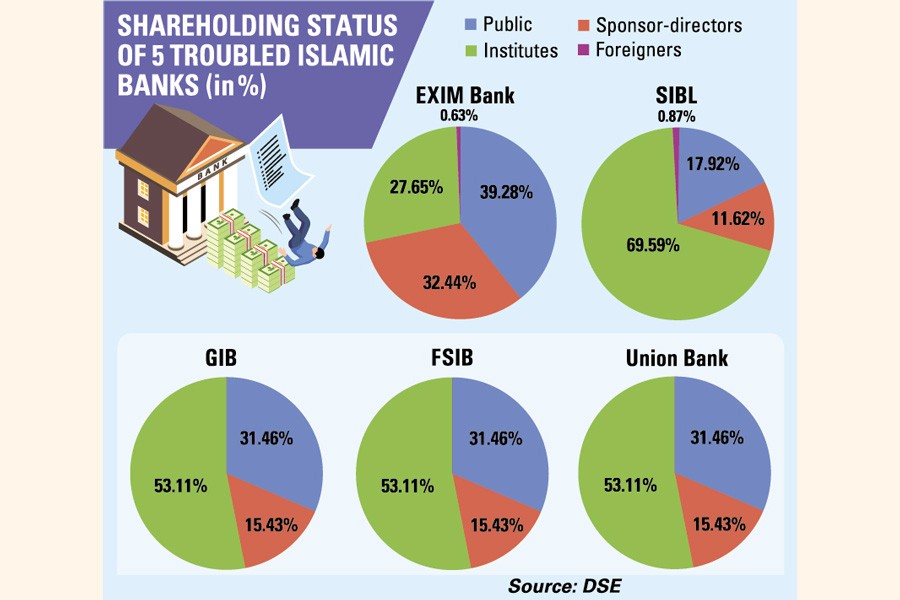Regulator outlines measures to protect retail investors in bank merger

Published :
Updated :

The securities regulator wants the new entity-set to emerge from the merger of five troubled Islamic banks-to issue shares to all existing general shareholders, based on the banks' sale value.
Talking to The FE, representatives of the Bangladesh Securities and Exchange Commission (BSEC) spoke of such a remedy for retail investors amid widespread concern over the fate of shareholder investments in the banks post-merger.
Referring to the Bank Regulation Ordinance, 2025, BSEC spokesperson Md. Abul Kalam said sponsors, directors, substantial shareholders, and top executives would be held responsible for fraudulent activities in any scheduled bank.
"General shareholders should not be deprived because of the people responsible for any scam," he added.
The banks to be merged are EXIM Bank, First Security Islami Bank, Global Islami Bank, Social Islami Bank, and Union Bank. These banks incurred steep losses last year.
Mr. Kalam said general investors would get nothing if the banks' book values were taken into account.
However, the banks have significant sale value, he said, citing what was prescribed by a top official of the commission.
"After the merger, their existing human resources will not be curtailed. The branches of the banks also will not be closed. There would be no significant establishment cost for the new entity."
The financial strength of some of the banks to be merged is even better than that of a number of state-run commercial banks, said Mr. Kalam, adding that an international auditor reviewing EXIM Bank's financial status reported its non-performing loans (NPLs) at 30 per cent of outstanding loans.
"There are state-run banks whose NPLs are higher than that of EXIM Bank," said the BSEC spokesperson. On the other hand, the five existing Islamic banks have good client bases.
"With all the matters taken into consideration, the five troubled banks seem to have good sale values."
Moreover, in four of the five banks facing merger, general shareholders hold a significant share of the paid-up capital-more than 31 per cent.
The government has formed an eight-member working committee to implement the bank merger, with no representation from the market watchdog, which has drawn criticism.
Secretary of the Financial Institutions Division (FID) of the finance ministry, Nazma Mobarek, said a committee was formulating guidelines for the merger.
"Everything will be clear when the committee publishes the guidelines," she said.
Meanwhile, market intermediaries and general investors have been fearing the worst.
Speculation is rife, driving the banks' stock prices in different directions on the bourses.
The stocks of all five banks-EXIM Bank, First Security Islami Bank, Global Islami Bank, Social Islami Bank, and Union Bank-dropped 36 to 48 per cent in the four months through the third week of September amid fears that investors would get nothing back from their investments.
Since September 24, the bank stocks have rebounded, rallying on the Dhaka Stock Exchange (DSE).
Of them, Social Islami Bank's stock appreciated 42 per cent in the last four sessions to Tk 4.40 per share on Tuesday.
Market operators say the speculation is tied to various issues, including regulatory decisions.
"So, the regulator should clarify confusions to stem the spread of speculation that may cause losses to retail investors," said a senior official of BRAC EPL Stock Brokerage, requesting anonymity.
Determining post-merger share value
Mr. Kalam said the regulator's minimum expectation was that the shares of the new entity would be priced at either the current market price of the Islamic banks' shares or at the face value of Tk 10-whichever is higher.
The stocks of all five banks are now trading below the face value of Tk 10 per share.
On Tuesday, the stock of SIBL closed at Tk 4.40 per share, EXIM Bank at Tk 4.0, First Security Islami Bank at Tk 2.60, Union Bank at Tk 1.90, and GIB at Tk 1.80.
The Shariah-compliant lenders had positive net asset value (NAV) even one or two years ago. Investors would have received something from their investments had the merger taken place at that time.
Now, the banks' liabilities are much higher than their assets, raising the possibility of retail investors getting nothing if the book value is considered.
"But general investors should not be deprived because of a situation created by any rogue group of people," Mr. Kalam said.
mufazzal.fe@gmail.com


 For all latest news, follow The Financial Express Google News channel.
For all latest news, follow The Financial Express Google News channel.